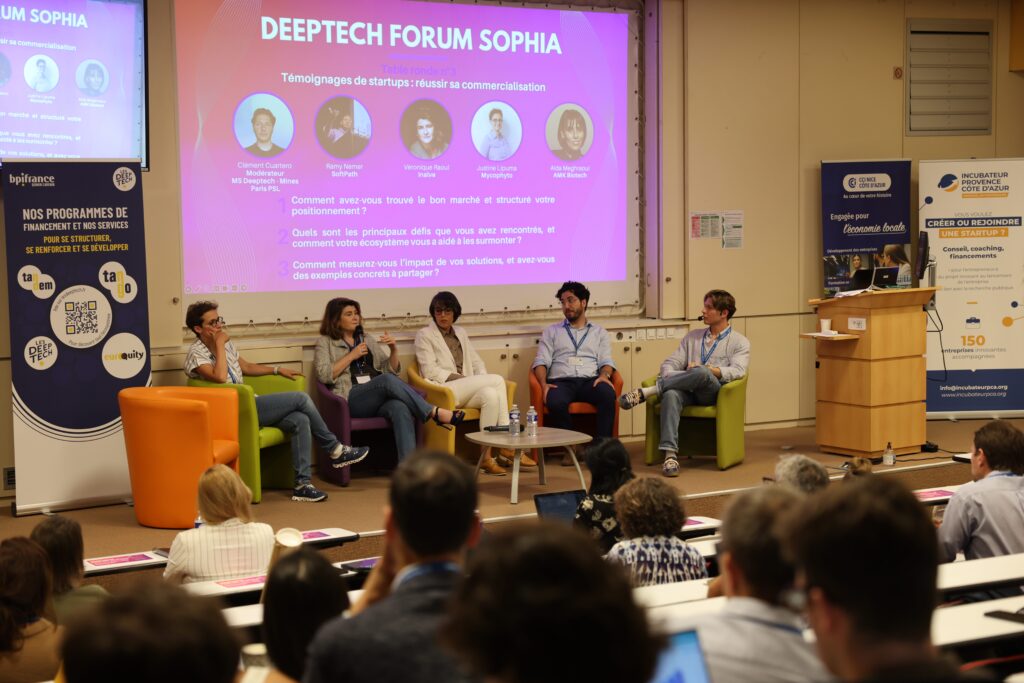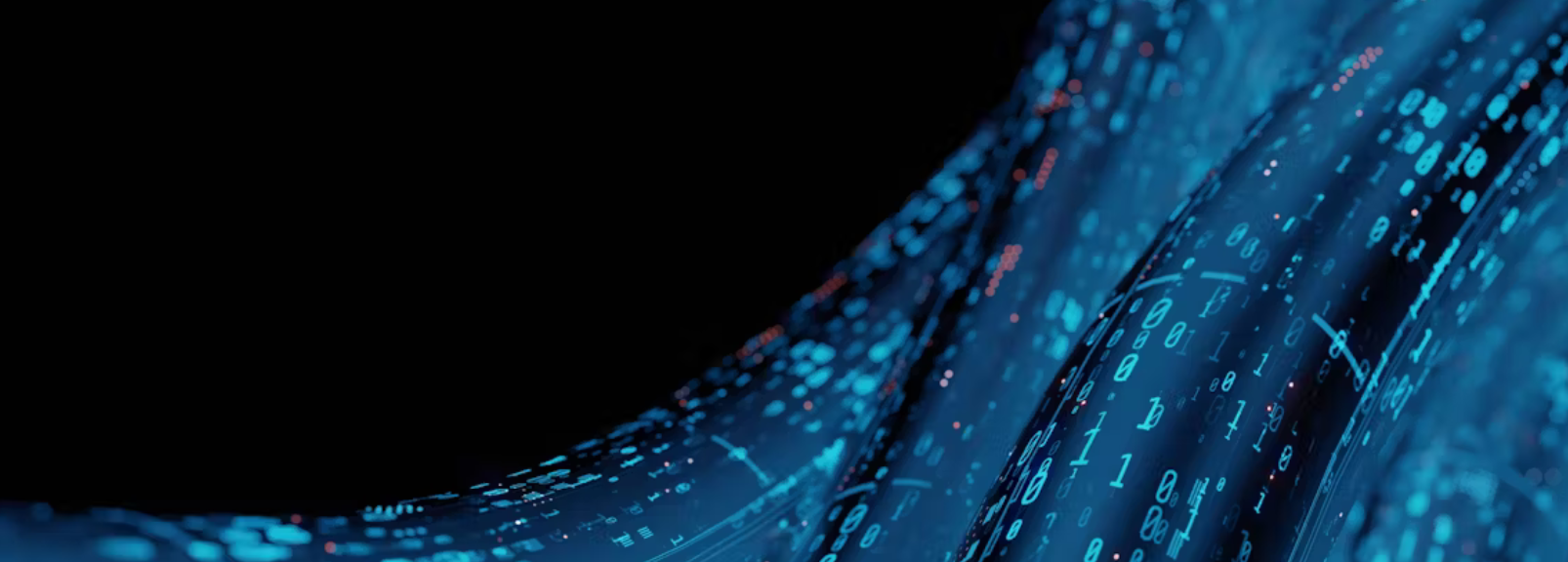What are the objectives of the Specialized Master’s in Deeptech Entrepreneurship & Innovation?
Wim Van Wassenhove: “The MS EDI aims to train future players in the deeptech ecosystem and disruptive innovation, capable of responding to the major technological challenges of our time: ecological transition, energy, health, digital technology, cybersecurity, and industrial sovereignty.
But this program is not limited to business creation. It prepares professionals to manage complex, science-intensive projects, whether they work in a start-up, a large corporation, a research laboratory, a funding organization, or support structures such as incubators, accelerators, or start-up studios.
Our ambition is to convey a systemic vision of innovation. This requires combining solid technical skills, a strategic understanding of the issues at stake, and the ability to mobilize the right levers to bring impactful projects to fruition. We train the people who accelerate technological and scientific innovation within companies.”
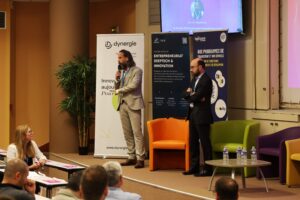
(From left to right) Wim Van Wassenhove, co-academic director of the MS EDI, and Cédric Prunier, director of Development, Partnerships, Entrepreneurship and Valorization (DPEV) at Mines Paris – PSL, at the Deeptech Forum in Sophia Antipolis, June 4, 2025.
Benjamin Cabanes: “This innovative program is specially designed to meet the needs of a wide range of professionals, including scientists, engineers, and managers from management schools. It provides the essential tools to operate effectively in a demanding deeptech ecosystem, where implementing innovation requires a hybrid culture that combines entrepreneurship, scientific rigor, and strategic vision. This integrated approach enables participants to successfully navigate the complexities of the deeptech sector and transform their innovative ideas into concrete, impactful solutions.
The diversity of participant profiles, whether they are researchers, engineers, financiers, or management professionals, greatly enriches the collective learning experience. This diversity reflects the complexity of real-world teams, fostering a more realistic and productive work dynamic.
This program is perfectly aligned with PSL University’s strategy, which places deeptech innovation at the heart of its priorities in order to respond to societal challenges. PSL offers students the opportunity to create their own start-ups during their studies through initiatives such as PSL-Pépite. This program, for example, supports PSL students and recent graduates in their entrepreneurial projects by offering them national Student-Entrepreneur status.
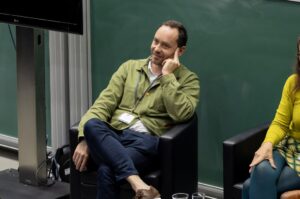
Benjamin Cabanes, co-academic director of the MS EDI.
The MS EDI’s teaching methods are based on immersive approaches. What are their specific features?
Benjamin Cabanes: “The MS EDI’s teaching methods are based on immersive approaches with distinct features.
One of the distinctive features of this program is its resolutely active teaching approach, which makes it unique. Participants do not simply assimilate and understand the challenges of the deeptech ecosystem; they actively contribute to its construction.
A prime example of this method is the organization of the Deeptech Forum by the students themselves. This event is organized using a flipped classroom approach: students take charge of organizing the Deeptech Forum, a high-level event, by interacting directly with the ecosystem. This is not simply an exercise, but a concrete learning experience. This exercise draws on a variety of skills such as project management, strategic communication, networking, and a detailed understanding of innovation financing mechanisms. It thus places students at the heart of the dynamics of the sector’s players.”
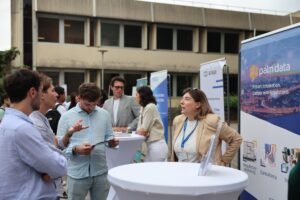
Company presentations at the Deeptech Forum in Sophia Antipolis, June 4, 2025.
Wim Van Wassenhove: “One of the foundations of the program is work-study, which anchors learning in the reality of start-ups, innovation structures, and innovation financing structures. This balance between high-level academic teaching (one week per month for 11 months) and professional immersion (three weeks per month) allows participants to work on real-life cases, which they tackle using the tools and methods taught throughout the program.
This constant link with the field is essential: it fosters the emergence of collective intelligence, deeply rooted in the operational realities of the ecosystem. The aim is not only to train experts, but also deeptech practitioners who are capable of acting in uncertain situations.
The projects addressed are concrete, complex, and interdisciplinary. Students are never passive listeners: they are put in a position of leadership. This allows them to develop key skills in design, strategy, and anticipation, which are essential for thriving in the demanding world of deeptech innovation.”
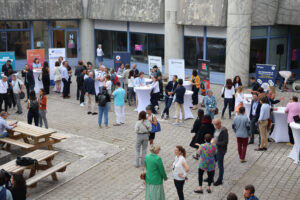
Deeptech Forum in Sophia Antipolis, June 4, 2025.
How does this program benefit the business world?
Wim Van Wassenhove: “The MS EDI maintains ongoing links with businesses, from start-ups to large corporations. These organizations are currently looking for people who can communicate with researchers, understand scientific advances, and transform them into robust innovation strategies. That is precisely the type of profile we are training.
Thanks to in-depth training in technological, legal, and financial issues, graduates are able to integrate, structure, or support innovation systems in highly uncertain environments.”
They thus become strategic resources for companies, providing vision, foresight, and commitment to the transitions underway. They are immediately operational talents, perfectly trained in the specificities of deeptech projects: technological complexity, long timeframes, and high uncertainty.
Finally, their strength lies in their hybrid profile: they are able to dialogue as easily with a researcher as with a CFO or an investor, seamlessly articulating strategic vision and execution in the field.
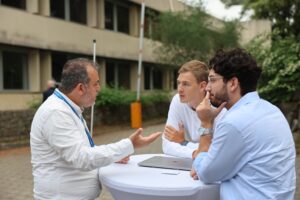
(From left to right) Elie Hachem, Director of the Center for Materials Processing (CEMEF) at Mines Paris – PSL, Alan Ferbach, co-founder and CEO of the start-up Videtics, Ramy Nemer, research engineer at CEMEF and founder and CEO of the start-up Softpath, at the Deeptech Forum in Sophia Antipolis, June 4, 2025.
Benjamin Cabanes: “Training is a major asset for the business world for several reasons.
First, it develops a capacity for hybridization that is essential today, because deep tech cannot develop without solid bridges between science, industry, and the market. Thanks to its link with PSL, this program allows students to cross disciplines and create synergies with prestigious institutions such as ESPCI, Chimie ParisTech, Institut Curie, and Agoranov.
In addition, this program is a gateway to strategic networks, including incubators and investment funds. The MS EDI acts as a bridge, connecting laboratories to markets, engineers to investors, and ideas to solutions. Companies find employees who are capable of supporting a start-up or leading an innovation program within a large group. For incubators and funds, it is an opportunity to identify profiles that understand both scientific dynamics and business logic. This training program thus transforms technical experts into leaders of innovation projects.
Finally, one of the missions of this training program is to structure a common language between science, industry, and finance, thereby promoting more effective and innovative collaboration.”
See you at the Deeptech Forum Paris
The Deeptech Forum, organized by MS EDI participants, will take place on June 26 in Paris. The event will bring together start-ups, researchers, financiers, and decision-makers to advance the financing and structuring of deeptech innovation.
Registration
